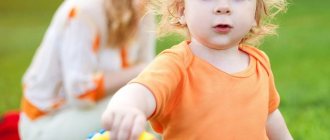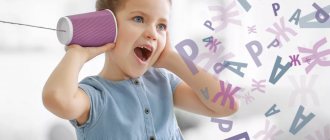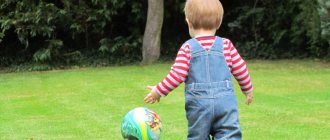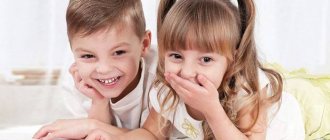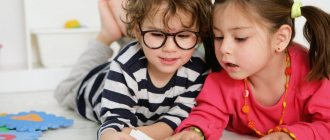Article:
There is no certain period of time during which one can and should intensively engage in the development of speech - and that’s it - as if by a wave of a magic wand, the baby took and spoke in whole sentences.
This is a rather lengthy process and takes its own time for each individual child. Parents lay the foundations on which knowledge and skills are laid like bricks. Speech development is not only dealt with from one to two years of age, until the child speaks - this is a process that has no clear boundaries. Many adults are actively developing and improving their speech and speech skills.
Factors on which speech development depends
Each child is individual, but psychologists and speech therapists identify four main factors that influence speech development:
- Anatomical features - the correct structure and functioning of the speech apparatus (tongue, palate, larynx, vocal folds), correct breathing.
As soon as the baby is born, he is immediately examined by a neonatologist and pediatrician, and during the first year of life by other specialists - a neurologist, dentist, etc. This is done in order to exclude various birth defects, to identify any diseases or predispositions in the early stages, and also prevent the development of the disease.
If deviations from normal development are detected, the doctor will be able to recommend correcting the anatomical defect, or preparing for subsequent correction. For example, a shortened frenulum does not allow the tongue to fully move in the oral cavity, and it does not reach the palate. Thus, it predetermines the occurrence of incorrect sound pronunciation.
- Physiological component. The connection between the brain and fine motor skills has long been proven - by developing small hands, you can activate speech centers.
There are a huge number of finger games and activities aimed at developing tactile sensations (various cereals, objects of different shapes and sizes, etc.). The most well-known and beloved game is “Magic Bag”.
- Emotional component. This is, first of all, a close emotional connection with mom and dad.
It is considered ideal for a child to communicate with grandparents (on both sides), brothers and sisters. The more the baby communicates with his family, the faster he joins in the conversation with them (he will wink at some, “hug” at others, and say something to others).
- Social component. First, the baby begins to communicate with his parents by screaming, when this is the only way he can say that he is experiencing discomfort, then, when recognizing familiar faces, he fixes his gaze, begins to smile, reaches out with his arms, etc. Therefore, everything that the child does is important - be sure to express emotionally your joy, tenderness, admiration.
In addition, in addition to the above factors, many specialists (speech therapists, psychologists, speech pathologists) indicate the influence of the speech of others - especially correct from the point of view of phonetics. For example, if one of the parents “burrs,” then most likely the son or daughter will do this based on imitation of a significant adult. In this case, it is advisable to correct the pronunciation of the sound P in parallel between the child and the adult.
What is normal speech development
Psychologists and speech therapists distinguish three main periods in the development of speech:
- Preparatory (from birth to 1 year).
- Pre-school (from one year to 3 years).
- Preschool (3 – 7 years old).
They are broken down into smaller stages. In each period, a child - with normal speech education and development - must master certain communication skills and learn specific things. For example, by the age of 3-4 years, a child’s vocabulary should already reach 3000-4000 words. The older the child, the more extensive and varied his lexical baggage should be, the easier it becomes for him to communicate with others. If some stage is missed, development is stopped (for example, by the age of three the child is still at the “booming” stage), then the norm has been violated, it is necessary to turn to specialists for help.
Parents need to know the norms of speech at a certain age and develop these skills, without overestimating them, but also not underestimating them. At first, you should not overload your child with learning poems and songs that are not appropriate for his age.
How a child’s speech is formed from birth to 3 years
The baby learns to communicate with the outside world from the very moment of birth. Let's take a look at how the speech development of young children occurs during the first 3 years of a child's life.
Norms of speech development in children from 0 to 3 years old
- 0 – 2 months. Scream. The first form of communication for a child is crying. The baby cries when he is hungry, uncomfortable or tired.
- 2 – 3 months. Booming. Crying is replaced by cheering. The sounds “a”, “s”, “u” appear, sometimes in combination with “g”. The child learns to understand speech addressed to him and control his own sound intonations.
- 3 – 6 months. Babble. The baby begins to babble to himself and make sounds when addressed to him. Turns his head towards the sound. Freezes in response to a sudden loud sound. Cries differently depending on needs: “I’m hungry,” “I’m tired.” Recognizes his name and reacts to it.
- 6 months. First syllables. From the age of 6 months, you can notice that the child prefers strictly certain sounds to all others: “ba”, “ma” (they are the easiest to learn to pronounce). He can repeat them endlessly: he likes the way they sound.
- 7 – 9 months. Combinations of syllables. The babbling progresses to the utterance of identical syllables: “ma-ma-ma”, “dya-dya-dya”, “ba-ba-ba”.
- 9 – 11 months . Onomatopoeia. The baby imitates the sounds of adults' speech. Responds to name. Understands the meaning of the word “no.”
- 11 – 13 months. The first meaningful words from two identical syllables: “dad”, “mom”, “baba”, “uncle”.
- 12 months. The baby shows interest and attention to the speech of others, repeats and combines sounds in a new way, combines them into “words”, imitating the speech of an adult. Understands and follows simple one-word instructions (“sit down”). He waves his hand “bye-bye”, shakes his head “no”. Uses gestures and sounds to attract attention. Interested in books.
Rarely does a parent know what signs indicate deviations in the child’s development. Therefore, for prevention, be sure to visit a pediatric neurologist at 3, 6, 9 and 12 months .
- 18 months. The baby easily repeats frequently heard words. Knows different parts of the body and points to them. Masters simple words (by the age of 2 years, their vocabulary can range from 20 to 50). Answers in words or gestures the questions: “Where is the bear?”, “What is this?” He loves when people read to him. At the request of an adult, he points his finger at the pictures in the book. 2 years. First sentences (two words). A two-year-old child can easily combine simple words mastered by the age of 2 into combinations: “Mom, give me,” “I want this,” “Where is the kitty?” Understands simple instructions consisting of two sequential actions: “Find your teddy bear and show it to grandma.” The vocabulary can expand to 150 - 200 lexemes, and others can already understand half of the words the child pronounces. The baby begins to use pronouns, adjectives and prepositions. Holds a book correctly in his hands. “Reads” to his toys.
- 3 years. Multi-word sentences (three or more words). At 3 years old, the period of early childhood ends. By this turning point, the child is able to compose sentences of three or more words. Distinguishes between colors and size definitions. Remembers and repeats familiar rhythms, melodies, stories. Some difficulties in sound pronunciation may still persist (whistling, hissing, vowel sounds). The vocabulary is expanding so much that parents can no longer accurately count how many words it consists of. In general, the baby is already ready to speak out on any occasion.
Stages of speech development
- Preparatory, or passive. It begins when the child is born and ends when he is 1 year old. At this time, the baby reacts to communication, understands where the sound is coming from, and is ready to play.
- Pre-school, or autonomous. Starts when your son or daughter turns one and ends at age 3. The first sounds and words are not yet entirely clear, but the baby is already trying to form phrases. At this time, vocabulary accumulates. The child understands words and uses them.
- Preschool or active. While a child is preparing for school, his speech is actively developing, and the number of people with whom he communicates increases. The baby can already speak coherently, clearly and comprehensively. Speech becomes a means of understanding the world around us.
- School. The most important, responsible and serious period of speech development. By the age of 18, a child learns the basic rules of grammar, punctuation, and spelling. At this time, it is no longer oral speech that develops, but written speech. The student begins to master literary speech. In addition, he develops a certain slang associated with his age and the company in which he is located.
Types of speech
Speech can be active or passive:
- Active - the one that the baby uses. The child knows the words he has learned, can confidently pronounce them, and construct sentences with their help.
- Passive is the one that the child understands, but for certain reasons does not pronounce. For example, he may know the word “TV”, but not say it because it is difficult for him.
It is very important to develop both active and passive speech of a child.
How to help develop speech by age
Up to a year old, the baby makes his first attempts to speak - he smiles in response to visual and verbal contact with adults, tries to say some sound or even repeat after mom or dad. Therefore, it is very important to focus on these attempts, smile, look at the baby, showing in every possible way that you are interested.
1-3 years. At this age, mothers and fathers, when communicating with a child, try (on an unconscious level) to speak to the baby in his language - briefly, understandably, clearly. Thus, the child understands what is being said to him, what he wants to say. Try to get rid of baby talk and empty repetition (such as “ba-ba”, “peek-a-boo”). The child must hear the words in full so that later he can say them the same way, and not shorten the syllables, rearrange them, distorting the meaning. Correct speech stimulates communication.
From 3 years and older. The most common opinion of most modern parents is that by sending a three-year-old child to kindergarten, the pace of communication can be slowed down, and all the necessary speech skills will be developed by the employees of the child care institution. This is wrong. Parental communication remains just as important, because it is in the family that the foundations of communication are laid, on which the rest of the acquired knowledge will be superimposed.
What is important for parents to know about the gradual formation of speech?
The main thing that must be understood at home is that speech development must begin from the very first days of the baby’s life. Don’t think that he is still small; when he grows up, he will learn to speak. This is a serious omission, since starting on time means achieving good results in the future. Knowledge about the speech skills of children at different ages will help mothers and fathers not only teach them to speak correctly, but also correct speech errors that appear. They should also understand that when working with children, they need to be patient. After all, the development of speech in preschool children is a long-term process; experts divide it into three stages, each of which has its own characteristics. Taking into account the mental characteristics of children, experts have determined general age norms for development. Parents should adhere to them, not forgetting that each child develops individually. That is why you should not compare your baby with other children.
If the baby is still at the preparatory stage, which occupies the entire infancy period (from birth to 1 year), he is only preparing for the acquisition of speech. But it is no less important than the speaking process itself, since it is at this time that a passive vocabulary accumulates.
- Mothers know well that at birth the baby exhibits speech reactions: he cries, screams. This is useful to a certain extent, as it affects important elements of the speech apparatus: breathing, voice, articulation. Even then you need to start working on your speech. How is this possible? It’s very simple, talk to the baby more often with different intonations. Bringing the baby’s face closer to you, speak clearly and distinctly so that the articulation apparatus is formed, do not remain silent when caring for the baby, discuss your every action.
- At 2-3 months, when the period of humming and babbling begins, encourage the baby to pronounce various sounds and syllables, together with the baby, “dadadak, bababak, mammak.”
- After six months, parents should pay more attention to word games, entertain the baby with finger games, and create situations in which the baby will use sounds and syllables. Then, by the end of the first year, the first words (about 12) will appear in the vocabulary, which the baby will use with pleasure, trying to convey intonation and articulation.
How to help young children develop speech
What can we, parents, do from the very birth of a child to ensure that he speaks naturally?
Let us remind you that the sensory channel for perceiving information about the external environment (vision, hearing, taste, smell and touch) is the main one for children in the first years of life.
Therefore, the answer lies on the surface: it is necessary to give the child as much information as possible about the world around him, as much as possible of any kind of sensory sensations and stimuli. Let's talk about it.
- Touch. Feeling #1 at first.
Mother's warm hands, her gentle touches, stroking, massage, gymnastics, toys of different shapes and textures, finger games - the more of this, the better.
Knowledge about oneself, one’s body and its sensations is formed through contact with the environment, so diversify the child’s tactile sensations as much as possible. Water of different temperatures (carefully!), soft fabric and rubber balls, a plastic rattle and a wooden cube, finger paints on a palette, sand in a children's sandbox, beans in a jar, etc. - the world is so rich for training your sense of touch!
- Hearing.
Give your baby as much information as possible that he can perceive by ear:
- sounds of music
- nature
- household appliances in the house
- street noise from the window
- sounds of native speech, etc.
Always talk to your baby about everything. Mom does this naturally, because speech accompanies any of her actions: she voices swaddling, feeding, bathing, and putting her to bed. She names objects surrounding the child, pointing at them.
When the baby starts to walk, the mother “keeps up the conversation”: she responds to the sounds the baby makes, repeats them and introduces him to adult speech, which the baby will try to imitate as he grows up.
- Vision.
We interest the baby in the objects around him so that he learns to focus his vision and maintain his attention on significant objects.
To help your child concentrate, you can hang bright colored objects above the crib (for example, balloons, fluffy pom-poms - they are quite light and will certainly attract attention).
Some mobile models come with removable toys to help adults provide a stimulating and varied space for their child. This is for the little ones.
Later, the arsenal of objects from the surrounding reality can be replenished endlessly, both due to toys in the house, and due to the visual impressions that the baby will receive when he is outside the home: on a city street, on a river, in a forest, in a zoo.
- Taste.
Mother's milk, water, teas, juices, pureed and solid food - what a variety of textures and tastes! Introduce your baby to them by gradually expanding the range of products that you introduce into baby food. The sooner a child becomes familiar with basic tastes, the less picky he will be in food later.
First word
What should a baby's first word be? Early development specialists believe that it does not necessarily have to be familiar and familiar to us. Experts tend to consider any recognizable set of sounds that denote a person, object or action (for example, “baka” instead of “dog”, “ka” instead of “porridge”) as a peculiar word.
Usually children say their first word at the age of 8-9 months. Most often these are onomatopoeias or words of two repeated syllables.
How to understand that a child said exactly a word, and not just a set of sounds? If the child’s statements are repeated under the same circumstances, even if you cannot understand them, rest assured that your baby said a word, his speech apparatus is simply not yet developed enough to pronounce this word legibly. To prevent your child’s speech development from slowing down, you should not speak to your baby in his “baby” language. If your child says “beep beep” while pointing at a car, say, “That’s right, it’s a car.” While walking in the yard, ask your child to show you the car. And to translate the word “car” from a child’s passive vocabulary to an active one, point to the car and ask: “What is that?” Then your baby will certainly learn a new word and learn to pronounce it correctly.
There is a myth that a child’s first word must be the word “mother.” Indeed, some children say “mom” as early as 4-5 months. Also, even before one year old, children can say “Lala”, “Baba”, etc. These are all easy-to-pronounce words that are formed from the repeated babble of a child. The words that are easy to pronounce come first.
Songs, rhymes and nursery rhymes for speech development in children 2 - 3 years old
These are perhaps the most effective, generation-tested ways of communicating with young children.
Basic principles:
- simple rhyme
- repetition of sounds or words
- small size
- accompaniment with gestures/actions
Rhyming poems can be told, or they can be sung using various melodies.
The main purpose of nursery rhymes, finger games, rhymes:
- emotional contact with the child
- development of his speech skills
- finger massage
- study of body parts
- assistance in establishing a routine
For example, by repeating the same rhyme before bedtime, you can develop in your child the expectation of a funny rhyme and the understanding that it is time for him to sleep.
IMPORTANT: Young children need consistency and order as this develops a sense of stability and security.
You can come up with or choose from the many available nursery rhymes, one for different occasions:
- morning hygiene procedures
rhyme for washing
- changing baby's clothes
rhyme when changing clothes
- preparation for swimming
bath rhyme
- before gymnastics
rhyme for gymnastics
- finger massage
poem for finger massage
- before bedtime
bedtime poems
The classic nursery rhymes “okay”, “cockerel-comb”, “horned goat”, “white-sided magpie” and many others will also delight the baby and be useful.
Playing and learning to speak: role-playing games for children
Options for playing with a child are limited only by the parents' imagination. At the same time, the child often independently suggests what he wants to do, distributes roles and organizes the game. Your mission is to fill the game with detailed dialogues so that the game is not only exciting, but also useful for the development of the baby’s speech. It can be:
- Hide and seek The classic game of “peek-a-boo” with infants can gradually change. You can hide behind anything, attracting the child with the words “where is mom?”, “find mom.” As the child grows up, he will begin to enjoy hiding on his own, and you, with appropriate verbal accompaniment, will look for him.
- Role-playing games At first, these can be very simple games. For example, you can play with a toy phone, a child can call mom, dad, brother, sister, say “Hello,” find out “how are you?” and vice versa. Then you can role-play fairy tales, come up with stories yourself, using household items and toys
- “Guess” There are many variations of games. You can ask your child: “guess what I’m doing?” and show some action: combing your hair, pouring tea into cups. Or ask: “guess who I am?” and depict a bunny or a bear cub. You can show soft animals and ask: “guess who it is?”, “what does he like to eat”, “where does he live?” If the child cannot answer, you should give a detailed answer yourself, and after a while repeat the questions to the child
- Active games Nursery rhymes and songs can be used in active play with the child, encouraging him to repeat the corresponding actions along with the words. This, in parallel with speech skills, will develop both the child’s physical and musical abilities. Examples:
nursery rhyme with movements 1
nursery rhyme with movements 2
What mistakes can parents make when developing their child’s speech?
Often the child is overly patronized and protected, they try to predict his desires - of course, out of love for him. But then the baby does not develop the desire to work independently, he does not learn to express his thoughts through speech, and many processes in his development may be inhibited.
• Intuition and love help loved ones understand a child literally at a glance. But communicating with unfamiliar people in unusual conditions will be difficult for him, and in the worst case, acutely uncomfortable. To prevent this from happening, as you grow older, you need to enter into conversations more often with new and new interlocutors, and then the child will simply be forced to improve his speech understanding skills.
• Some parents underestimate, while others overestimate, the requirements for the baby’s speech. In the first case, they do not demand anything from the child, all his wishes are guessed and immediately fulfilled, in the second, they constantly pester him: “Tell me!”, “Repeat!”. Sometimes in one family two extreme approaches are used at once: for example, dad demands, and grandmother takes care. This has a very adverse effect on the child’s speech development.
• Try to eliminate lisping, “baby talk,” and constant onomatopoeia when communicating with your baby. The parent's speech is a model for the child.
• Parents can speak very quickly or, conversely, too slowly, without pauses and different intonations, monotonously. It is important to use all the richness and diversity of language when developing a child’s speech.
• Do not try to speed up the baby's natural speech development. Avoid overwork from speech classes and memorization of poetry.
What influences the proper development of speech?
There are two groups of factors that influence speech development:
- Biological.
- Social.
The first include various pathogenic factors that can harm proper development: complex intrauterine development, brain infections and injuries, hearing impairment, heredity.
The second group is a combination of the child’s internal development processes and external conditions that are specific to each age stage. For example, the early separation of a baby from his mother sometimes causes emotional instability, impulsiveness, and behavioral disturbances. And this, in turn, leads to speech disorders.
Good conversation is influenced by examples and role models. The child first hears how they speak in the family, so he begins to try it himself. In order to correctly assimilate words during play activities, the child first accumulates impressions - this is the basis for future images and connections with them in speech. The development of gross motor skills also affects the correctness of conversation. The development of speech skills is influenced by the language a child learns to speak. An attempt to master several languages at once may slightly slow down a child’s development; his speech may develop more slowly.
In no case should a child be punished for mistakes in speech, teased or corrected with irritation. This can cause withdrawal and reluctance to try further.
The role of the family in the formation of speech reserve is key. Parents study poems and songs, recitations with their child, teach the child to speak at the right speed, and respond to his attempts to carry on a conversation.
Proper speech development is promoted by:
- Emotionally positive environment;
- Peace of mind in the family;
- Moderate sound communication between loved ones (no shouting);
- Feeling of security in the family;
- Patience of parents towards the child;
- Sensitive and friendly behavior of kindergarten teachers.


